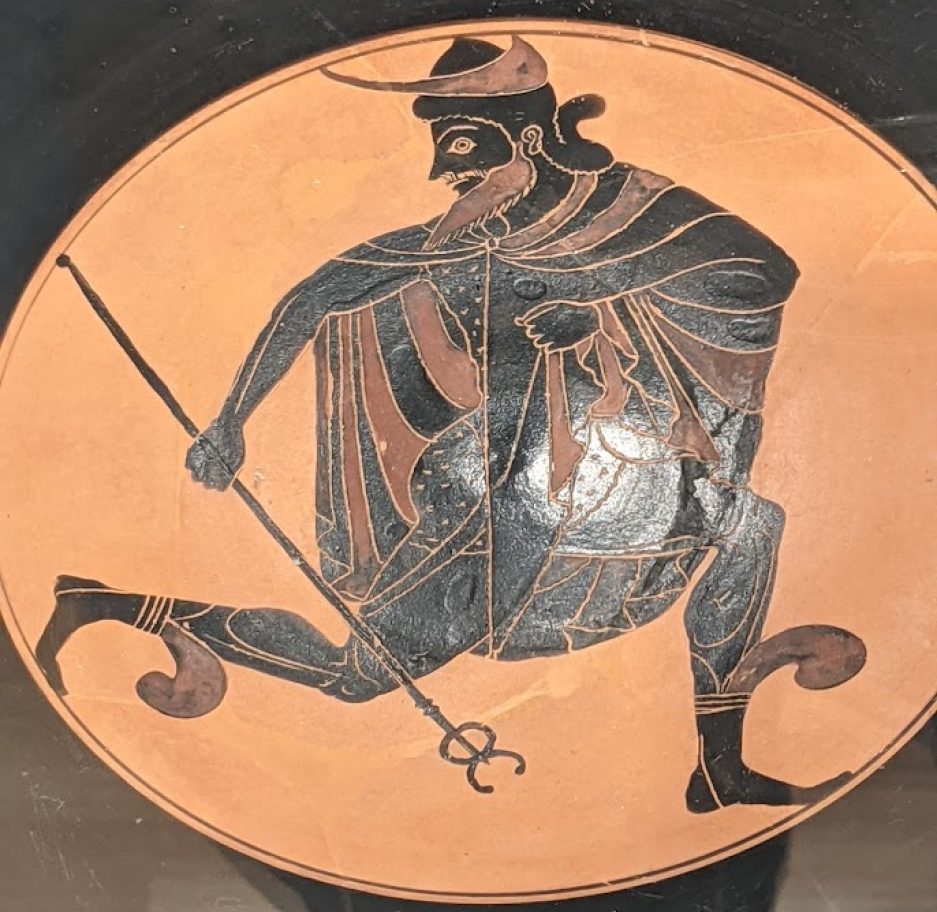The crown that Dionysus placed among
The stars of heaven when the world was young,
For Aphrodite and the Seasons thought
His bride deserving, so a gift they brought
To Ariadne on his wedding day;
In heaven did the god this crown display.
And one there is that said the god desired
Ariadne, and with the crown inspired
Her love, when he came down to see her sire,
For it was lightened by a holy fire
Which burned within, so it gave off a light,
Which was most pleasing in the damsel’s sight.
Hephaistos made it greater than its parts,
A dazzling work from all his cunning arts.
Again some men have said Dionysus took
And set it by, because he would not brook
Pollution of it by the hordes of dead
In Tartarus where all is grim and dread.
For he went down to bring his mother back,
And this accomplished, the god did not slack
To place it in the stars, eternally
Reminding all who see of Semele.
But finally, there’s some who say it’s there
Because the Kneeler, Theseus did wear
It, having got it from Thetis when he
Retrieved the ring of Minos from the sea.
He showed himself in truth Poseidon’s son,
When this tremendous task by him was done.
For though the tyrant Minos set his heart
On a damsel from Athens for his part,
Yet Theseus against the tyrant rose,
But said it was not fitting to oppose
A tyrant merely to defend a girl,
And so into the sea did Minos hurl
His ring to test the claim of the noble youth,
To prove if he was the god’s son in truth.
Poseidon’s wife gave Theseus the prize,
The crown to dazzle all beholding eyes.
And still it sits in heaven as a sign
Of triumph, truth, and all that’s good and fine.
Month: August 2022
Lyra
The Lyre which Hermes fashioned with his skill,
He gave Apollo for to work his will;
He stole the oxen of the Sun by sleight
And robbed him while the earth was cloaked in Night,
And Phoebus’ rage was kindled like a fire,
And so he sought to hurl him in his ire
Into the depths of Tartarus below,
But could not stem the cunning words that flow
From Hermes’ lips, whose speech is without peer,
As he so wills, it is obscure or clear,
And like a labyrinth do they twist and turn:
The cunning only manage to discern
His meaning. Such was Zeus, who can’t be fooled,
Whose strength of mind cannot be overruled.
For Hermes spoke, and winked upon his sire,
Who laughed and loved his begotten liar.
And Hermes played a most enchanting song
And charmed Apollo’s heart with it ere long.
The gods now friends, they each exchanged a gift,
And by this act they healed their former rift.
For Hermes gave his Lyre unto the Sun,
To play each day while his fierce coursers run,
And for the herd with which he did abscond,
Apollo forgave him, and gave him a wand.
And Hermes parted serpents when they fought,
And made a peace where danger had been fraught.
In time, the Sun gave Orpheus the Lyre,
And taught him how to man and beasts inspire;
The poet praised th’eternal gods with song,
But he forgot one god and did him wrong;
For Dionysus did he fail to praise,
And so the Bacchants made an end of days
For him, and torn to pieces did his head
Roll down into the sea when he was dead.
The Muses placed his Lyre up in the sky,
That memory of him might never die.
